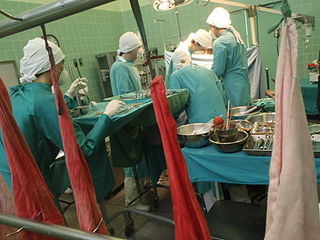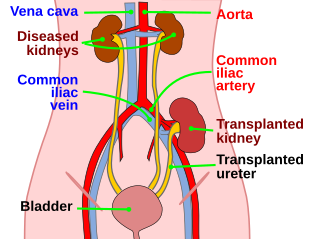External links
| | This article related to government in the United Kingdom or its constituent countries is a stub. You can help Wikipedia by expanding it. |
ULTRA, the Unrelated Live Transplant Regulatory Authority, was a British agency that regulated organ transplants. According to the official website:
In September 2006, ULTRA disbanded. Its functions were transferred to the Human Tissue Authority, a non-departmental public body of the Department of Health.

Organ donation is the process when a person authorizes an organ of their own to be removed and transplanted to another person, legally, either by consent while the donor is alive, through a legal authorization for deceased donation made prior to death, or for deceased donations through the authorization by the legal next of kin.

Organ transplantation is a medical procedure in which an organ is removed from one body and placed in the body of a recipient, to replace a damaged or missing organ. The donor and recipient may be at the same location, or organs may be transported from a donor site to another location. Organs and/or tissues that are transplanted within the same person's body are called autografts. Transplants that are recently performed between two subjects of the same species are called allografts. Allografts can either be from a living or cadaveric source.
The Uniform Anatomical Gift Act (UAGA), and its periodic revisions, is one of the Uniform Acts drafted by the National Conference of Commissioners on Uniform State Laws (NCCUSL), also known as the Uniform Law Commission (ULC), in the United States with the intention of harmonizing state laws between the states.

Kidney transplant or renal transplant is the organ transplant of a kidney into a patient with end-stage kidney disease (ESRD). Kidney transplant is typically classified as deceased-donor or living-donor transplantation depending on the source of the donor organ. Living-donor kidney transplants are further characterized as genetically related (living-related) or non-related (living-unrelated) transplants, depending on whether a biological relationship exists between the donor and recipient. The first successful kidney transplant was performed in 1954 by a team including Joseph Murray, the recipient's surgeon, and Hartwell Harrison, surgeon for the donor. Murray was awarded a Nobel Prize in Physiology or Medicine in 1990 for this and other work. In 2018, an estimated 95,479 kidney transplants were performed worldwide, 36% of which came from living donors.
The Human Tissue Authority (HTA) is an executive non-departmental public body of the Department of Health and Social Care in the United Kingdom. It regulates the removal, storage, use and disposal of human bodies, organs and tissue for a number of scheduled purposes such as research, transplantation, and education and training.
Organ procurement is a surgical procedure that removes organs or tissues for reuse, typically for organ transplantation.
Certain fundamental Jewish law questions arise in issues of organ donation. Donation of an organ from a living person to save another's life, where the donor's health will not appreciably suffer, is permitted and encouraged in Jewish law. Donation of an organ from a dead person is equally permitted for the same purpose: to save a life. This simple statement of the issue belies, however, the complexity of defining death in Jewish law. Thus, although there are side issues regarding mutilation of the body etc., the primary issue that prevents organ donation from the dead amongst Jews, in many cases, is the definition of death, simply because to take a life-sustaining organ from a person who was still alive would be murder.

The National Organ Transplant Act (NOTA) of 1984 is an Act of the United States Congress that created the framework for the organ transplant system in the country. The act provided clarity on the property rights of human organs obtained from deceased individuals and established a public-private partnership known as Organ Procurement and Transplantation Network (OPTN). The OPTN was given the authority to oversee the national distribution of organs.
The Healthcare Systems Bureau is part of the Health Resources and Services Administration (HRSA), of the United States Department of Health and Human Services.
Organ trade is the trading of human organs, tissues, or other body products, usually for transplantation. According to the World Health Organization (WHO), organ trade is a commercial transplantation where there is a profit, or transplantations that occur outside of national medical systems. There is a global need or demand for healthy body parts for transplantation, which exceeds the numbers available.

Human trafficking in South Africa occurs as a practice of forced labour and commercial sexual exploitation among imported and exported trafficked men, women, and children. Generally, South African girls are trafficked for the purposes of commercial sexual exploitation and domestic servitude, while boys are used for street vending, food service, and agriculture. Anecdotal evidence suggests that South African children can also be forced to provide unpaid labor for landowners in return for land occupancy, living accommodation, or for maintaining labor tenancy rights. In any case, this form of unpaid labor has caused human trafficking to be described as a modern form of slavery. Human trafficking is the result of a combination of several factors, including gender inequality, economic instability, and political conflict. Since Africa experiences all of these, it is an active hub for human trafficking. Many urge for the need of a cultural shift to reduce instances of human trafficking by lessening the demand for sex and unpaid labor.
In December 2006, The UK Government set up the Organ Donation Taskforce to identify barriers to organ donation and recommend actions needed to increase organ donation and procurement within the current legal framework.

Mehmet Haberal, is the founder of Başkent University in Ankara, Turkey, best known for becoming the first transplant surgeon in Turkey after leading the team that performed Turkey's first living-related kidney transplant in 1975, after he returned from surgical training under the mentorship of American surgeon Thomas Starzl, with whom he also performed some of the longest surviving early liver transplantations.
Organ transplantation in Israel has historically been low compared to other Western countries due to a common belief that organ donation is prohibited under Jewish law. This changed with the passage of new organ donation laws in 2008. If two patients have the same medical need, priority will now go to the patient who has signed an organ donor card, or whose family members have donated an organ. This policy was nicknamed don't give, don't get. The law also defines "brain death" as an indication of death for all legal purposes, including organ donation. Additionally the law provides financial reimbursement to living donors for medical expenses due to donation and lost time at work. Organ trafficking is explicitly banned. Health insurance plans can no longer reimburse patients who go abroad to receive transplants.

The Ministry of Health is a ministry of the Government of Malaysia that is responsible for health system: health behaviour, cancer, public health, health management, medical research, health systems research, respiratory medicine, health promotion, healthcare tourism, medical device, blood collection, leprosy control, clinical research, health care, dental care, health institution, laboratory, pharmaceutical, patient safety.

The Human Tissue Act 2004 is an act of the Parliament of the United Kingdom, that applied to England, Northern Ireland and Wales, which consolidated previous legislation and created the Human Tissue Authority to "regulate the removal, storage, use and disposal of human bodies, organs and tissue." The Act does not extend to Scotland; its counterpart there is the Human Tissue (Scotland) Act 2006.
Allegations of forced organ harvesting from Falun Gong practitioners and other political prisoners in China have raised concern within the international community. According to a report by former lawmaker David Kilgour, human rights lawyer David Matas and journalist Ethan Gutmann of the US government–affiliated Victims of Communism Memorial Foundation, political prisoners, mainly Falun Gong practitioners, are being executed "on demand" in order to provide organs for transplant to recipients. Reports have said that organ harvesting has been used to advance the Chinese Communist Party's persecution of Falun Gong and because of the financial incentives available to the institutions and individuals involved in the trade. A report by The Washington Post has disputed some of the allegations, saying that China does not import sufficient quantities of immunosuppressant drugs, used by transplant recipients, to carry out such quantities of organ harvesting. However, the Victims of Communism Memorial Foundation alleged that the Post's article made an “elementary statistical error” and omitted unofficial pharmacy data in Chinese hospitals.
Organ donation is when a person gives their organs after they die to someone in need of new organs. Transplantation is the process of transplanting the organs donated into another person. This process extends the life expectancy of a person suffering from organ failure. The number of patients requiring organ transplants outweighs the number of donor organs available.

The Transplantation of Human Organs and Tissues Act, 1994 is the Law enacted by the Parliament of India and introduced by the Ministry of Health and Family Welfare dated 4 February 1994, which deals with the transplantation and donation of 11 human organs and tissues of an alive donor or deceased person. This act is applicable to only those Indian administered states where the act has been adopted or enforced by the state governments. But it applies to all Union territories.
Organ donation in India is regulated by the Transplantation of Human Organs and Tissues Act, 1994. The law allows both deceased and living donors to donate their organs. It also identifies brain death as a form of death. The National Organ and Tissue Transplant Organisation (NOTTO) functions as the apex body for activities of relating to procurement, allotment and distribution of organs in the country.